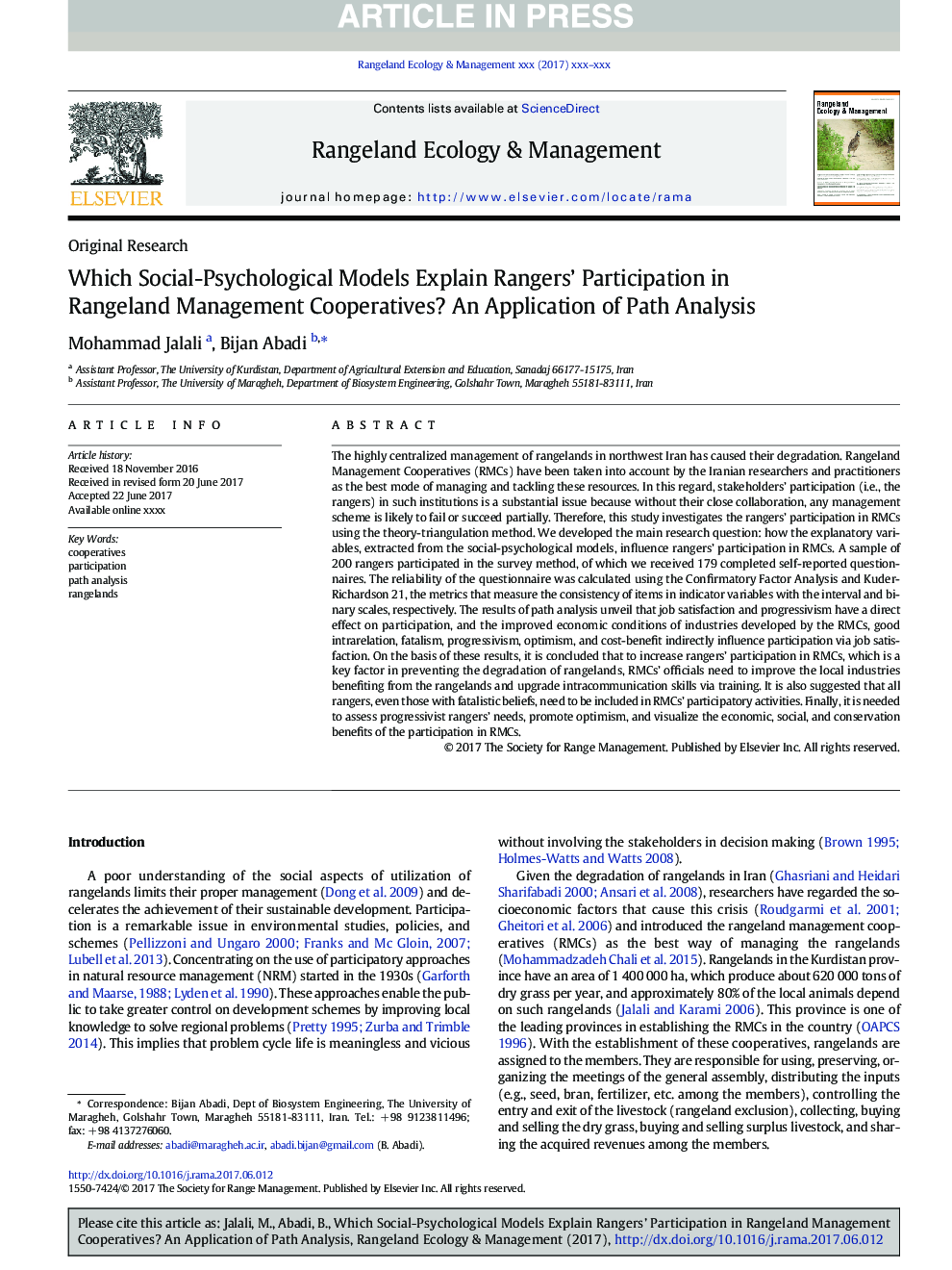| کد مقاله | کد نشریه | سال انتشار | مقاله انگلیسی | نسخه تمام متن |
|---|---|---|---|---|
| 8849656 | 1618646 | 2018 | 12 صفحه PDF | دانلود رایگان |
عنوان انگلیسی مقاله ISI
Which Social-Psychological Models Explain Rangers' Participation in Rangeland Management Cooperatives? An Application of Path Analysis
ترجمه فارسی عنوان
کدام مدل های اجتماعی-روانشناختی، مشارکت رنجرز در تعاونی های مدیریت مرتع را توضیح می دهد؟ کاربرد روش تجزیه و تحلیل مسیر
دانلود مقاله + سفارش ترجمه
دانلود مقاله ISI انگلیسی
رایگان برای ایرانیان
کلمات کلیدی
تعاونی ها، مشارکت، تحلیل مسیر، مراتع،
موضوعات مرتبط
علوم زیستی و بیوفناوری
علوم کشاورزی و بیولوژیک
علوم کشاورزی و بیولوژیک (عمومی)
چکیده انگلیسی
The highly centralized management of rangelands in northwest Iran has caused their degradation. Rangeland Management Cooperatives (RMCs) have been taken into account by the Iranian researchers and practitioners as the best mode of managing and tackling these resources. In this regard, stakeholders' participation (i.e., the rangers) in such institutions is a substantial issue because without their close collaboration, any management scheme is likely to fail or succeed partially. Therefore, this study investigates the rangers' participation in RMCs using the theory-triangulation method. We developed the main research question: how the explanatory variables, extracted from the social-psychological models, influence rangers' participation in RMCs. A sample of 200 rangers participated in the survey method, of which we received 179 completed self-reported questionnaires. The reliability of the questionnaire was calculated using the Confirmatory Factor Analysis and Kuder-Richardson 21, the metrics that measure the consistency of items in indicator variables with the interval and binary scales, respectively. The results of path analysis unveil that job satisfaction and progressivism have a direct effect on participation, and the improved economic conditions of industries developed by the RMCs, good intrarelation, fatalism, progressivism, optimism, and cost-benefit indirectly influence participation via job satisfaction. On the basis of these results, it is concluded that to increase rangers' participation in RMCs, which is a key factor in preventing the degradation of rangelands, RMCs' officials need to improve the local industries benefiting from the rangelands and upgrade intracommunication skills via training. It is also suggested that all rangers, even those with fatalistic beliefs, need to be included in RMCs' participatory activities. Finally, it is needed to assess progressivist rangers' needs, promote optimism, and visualize the economic, social, and conservation benefits of the participation in RMCs.
ناشر
Database: Elsevier - ScienceDirect (ساینس دایرکت)
Journal: Rangeland Ecology & Management - Volume 71, Issue 1, January 2018, Pages 126-137
Journal: Rangeland Ecology & Management - Volume 71, Issue 1, January 2018, Pages 126-137
نویسندگان
Mohammad Jalali, Bijan Abadi,
